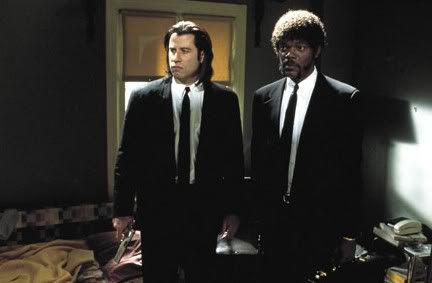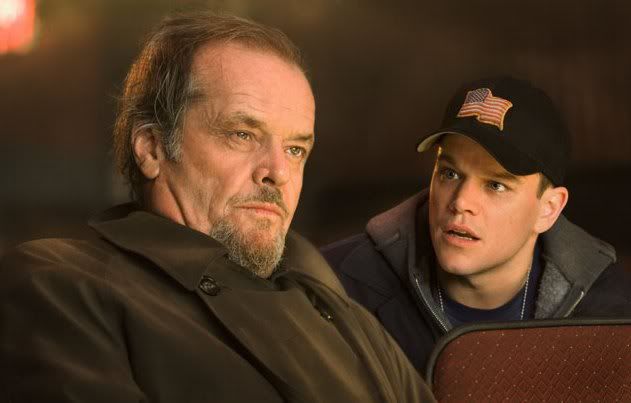Hubarin mo ang iyong maskara, upang ikaw ay makilala...
Well, what can I say? The hype was definitely spot-on. Erik Matti, whose last work is the highly enjoyable, Grindhouse-like film "Tiktik: The Aswang Chronicles", has unexpectedly shifted gears, veering himself away from the fantasy/horror elements that have since become almost synonymous with his name, to direct what may be the most intense piece of local cinema that you may ever come across for quite a while. Though I can fully understand why this was not chosen to be the Philippines' official entry to the Academy Awards, I can also fully see why Erik Matti is quite sour about it. Do not get me wrong, "Transit", what with its highly international flavor and sensitive take on foreign policies in Israel, is a powerful film in its own right. But hell, "On the Job", at least for me, is on a different level. Though it can be fairly argued that the film is, in many ways, highly indebted to either "Infernal Affairs" or "The Departed" or even "Collateral" to a certain extent in terms of plot construction and visual texture, the film is nonetheless a shining example of how to do a modern 'Pinoy' action film right. I mean, let's admit it, gone are the action movie days where a straight-laced cop played by either FPJ or Rudy Fernandez can bring down an entire system by just using his gun-toting coolness and pure brawn. Also, the era where action heroes and conniving villains ultimately settle their moral differences inside abandoned warehouses has already come and go.
For the past few years, the action genre is as good as dead, and no filmmaker dared to lift a finger. I don't know if Matti did this film to, in a way, resuscitate it, but, hey, I don't care, because what he has created here is way more than a decent action film. As God is my witness, what I've seen is a masterpiece not just in terms of action and plot swerves, but also in terms of tension and fear. It's a thriller film without monsters in the closet, a crime film with little to no involvement from criminals, and a gangster film without actual gangsters. Perhaps the reason why 'gangster' films can never really make it big here in the Philippines (except for E.R. Ejercito's MMFF projects, of course, which are also occasional flops) is because one must not look any further than our local police force if one wants to see an actual gang operate. That, I think, is what "On the Job" is pessimistically trying to prove: that the Philippines is, and will always be, run by thugs regardless if they're wearing uniforms or not. But then again, it has been said that "pessimists are just optimists with better information", so I wouldn't entirely count out the possibility that Erik Matti himself has actually taken hold of some 'juicy' insider information about our police force while researching for the film. After all, the film is, quote unquote, "inspired by true events" so, yeah, on second thought, color me surprised if he actually has not. But still, with or without that 'juicy' information to make the film look more frighteningly legit, this one still rocks.
In terms of its visual style, the film is very, very (and I'm going to add another 'very') detailed, roughed-up, and ruggedly red-blooded. There's this scene in the film where both Tatang (Joel Torre in one of his best performances ever, bar none), a veteran hitman, and Daniel (Gerald Anderson in a great turn if not for his 'Thigalog'), the young man under his tutelage, enters a 'litsunan' somewhere in the heart of Manila to search for their poor target. With freshly-roasted swines on bamboo sticks sitting everywhere, of course, it's but an obvious symbolism on Matti's, or even production designer Richard Somes', part: that the act that these two characters are about to commit can be likened to a butcher slaughtering a pig. But outside that thematic configuration, of course, the entire atmosphere of the 'litsunan', and eventually the entirety of Manila itself, seems to slowly take on a life of its own ironically as people start to drop dead.
Aside from the characters, everything in this film, though it is but given that "On the Job" deals largely with corruption, anxiety, and everything dreadful, feels so alive. Another case in point: the almost visually baroque rendition of the prison and how the camera glides across every hallway and room like it's some kind of a doomed labyrinth. I know, 'poetic' is not the right term to describe the film's imagery, and neither is the word 'lyrical' (Ugh, I feel so pretentious right now). More than anything else, I think 'inspired' is the correct word. Then again, what do you expect when Erik Matti and Richard Somes ("Yanggaw", "Corazon: Ang Unang Aswang") join forces?
Though Manila has been seen in different kinds of light all throughout the history of Philippine cinema, I've never been intimidated of its false sense of nobility (the honorable-looking police headquarters, posh hotel lobbies, and exquisite function rooms) and frightened of its abundant squalor more than here in "On the Job". I've seen my fair share of 'poverty porn' films, mind you, and these pictures have made me trust the said city less and less. But never have I seen Manila in such a state where morality seems only applicable to dogs, where blood can be shed everywhere even on dank sidewalks, and where people can die at any given time even at the comforts of their own hospital beds. Corruption is one thing, sure, but killing is another. "On the Job" may be a little bit vague about the former (the ostensibly 'straight' characters in the film doesn't really go into detail except for them stating several times that they do not want the 'mess' to reach Malacañang), but the 'killing' part? Well, what can I say? It will make you squirm, shout profanities on whoever's next to you and then at the screen, and then squirm and shout and squirm some more. And for an action film to manage to do that? That's magic. This is the kind of filmmaking that Hitchcock, I think, was pertaining to when he once said that he enjoys playing the audience like a piano.
The cast, comprised of seasoned veterans, is a joy to watch, as they interact in ways that may either make you smile a bit (Joey Marquez & Piolo Pascual), get a little achy in the stomach (Gerald Anderson & Joel Torre), or downright feel helpless (Piolo Pascual & Leo Martinez). Going back to my "The Departed" comparison, "On the Job" is also mounted the same way in terms of character arrangement. In "The Departed", there was Jack Nicholson serving as the Qui-Gon Jinn to Matt Damon's Obi-Wan Kenobi. On the other hand, there's Martin Sheen's Pat Morita to Leonardo DiCaprio's Ralph Macchio. Like "The Departed", "On the Job" is also a 'mentor-apprentice' film. There's Piolo Pascual's Francis Coronel Jr., an NBI agent whose puppet master of a father-in law, Manrique (Michael de Mesa), controls and dictates his every move like a dirty conscience. There's also Tatang, who not so sparingly teaches the neophyte hitman Daniel the very careful ways of killing people as if it's the most immaculate thing in the world. Now I wouldn't be a bummer here and feed you specific details and spoil your enjoyment of the film, but for the record, let's just say that these four characters will inevitably cross paths and unwittingly add fuel to the already scorching fire.
"On the Job", though ironically not for everyone, MUST be seen by everyone. It's the kind of film that may put people off with its themes but will nonetheless still persist to be seen, experienced, and then some. The film will shock, thrill, and even offend (what with its abundant use of our national expletive), but what it definitely won't do is disappoint. But if ever there's one thing I sorely regret about this film, then it is my failure to watch it on the big screen. Indie films may come and go, but this one's here to stay. Who knows? If this is the start of a new breed of Filipino action films, then our Pinoy movie diet for the next few years is already taken care of, and we only have Erik Matti, once the master of B-grade horror and fantasy films but is now shaping up to be a true action auteur in his own right perhaps ala Luc Besson, to thank for it. This one's an instant classic.
P.S. Erik Matti once did an interview for the Cinema One documentary "Indie, Mainstream, Paano Ka Ginawa?" where he stated that he hates it when international film festivals treat Filipino films as nothing but 'exotic dishes'. "Kumbaga, tayo yung balut," he then contemptuously added. With this film, in all fairness, I think he has preserved his stance regarding this issue. Not only has he created a Filipino film truly worthy of international attention, but he has also crafted something that's entirely of universal appeal. You want proof? Well, a Hollywood remake is already on its way.
FINAL RATING

.jpg)














